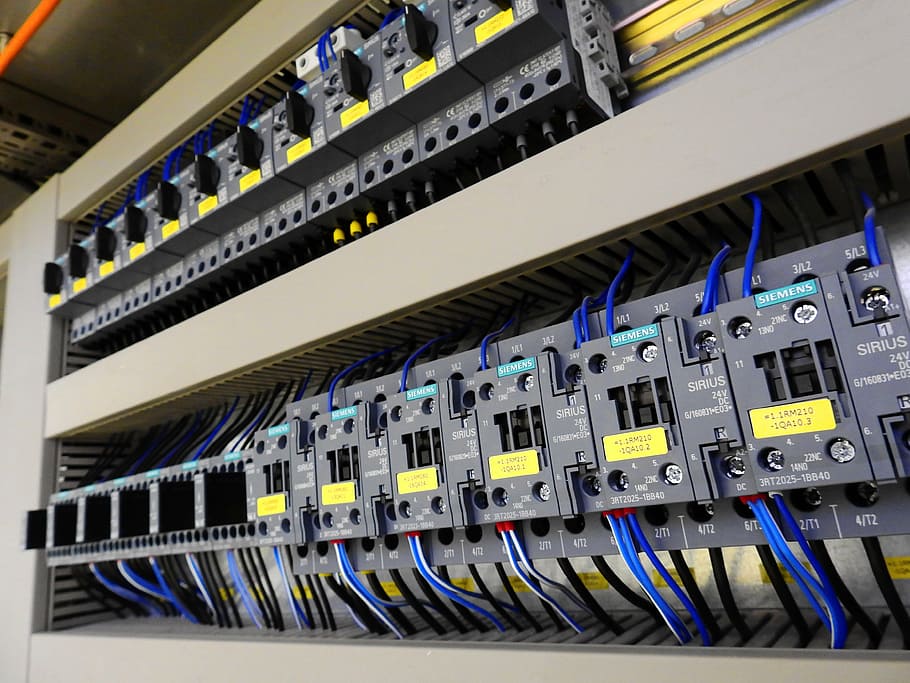
DDC stands for Direct Digital Control. In Turkish, it means “Doğrudan Dijital Kontrol.” Because there are many systems to be controlled, control units are grouped accordingly.
If MCC panels are used in building automation, they work together with DDC panels. In this case, DDC panels manage them. Thus, field devices such as fan motors, exhaust fans, circulation pumps, and booster pumps are controlled. Inside, there are programs loaded onto PLC or DDC control units. The SCADA software is connected to the system to perform data monitoring and control.
Each system can monitor different information via the DDC panel, such as:
- Heating and cooling system data of buildings
- Boiler room and machine room pump and burner data
- Temperature, humidity, pressure, and flow data via sensors
Based on this information and the programs loaded into the SCADA system, the DDC panel controls field devices. This ensures energy savings and prevents unnecessary usage.
How Do MCC and DDC Panels Communicate?
If both DDC and MCC panels are installed in a system, communication is established using different protocols, such as:
- Modbus
- CanBus
- FieldBus
- Profibus
- DeviceNet
- ControlNet
- AS-i
- Hart
LINCH cables may also be used between panels. A command entered from the automation computer reaches the DDC panel. The control card sends this command to the MCC panel, which then starts or stops the motor. Sensors provide communication between the two panels, transmitting information such as pressure, humidity, and temperature from mechanical devices. This data is read by DDC cards and processed in the automation computer.
System warnings are also generated this way. Additionally, labels, alarm indicators, and emergency stop buttons are included.
Where Can DDC Panels Be Used?
DDC panels have a wide range of applications. Essentially, they can be used anywhere MCC panels are present. Main application areas include:
- Shopping centers
- Treatment plants
- Pump stations
- Transportation facilities
- Factories
- Smart buildings
Are DDC Panels Standard?
DDC panels are used to control MCC panels and play a role in building automation. However, since every workplace and factory has different electrical systems, DDC panels are not standard. They are custom-designed according to needs. A detailed analysis is conducted before installation, and the panels are manufactured accordingly.
What Are the Features of DDC Panels?
DDC panels are manufactured to be compatible with automation. They include PLCs, control cards, and cable terminals. Monitoring and control functions for automation are handled here. In addition, MCC panels can also be managed via DDC. Data from sensors is collected, interpreted, and transferred to the computer.
- Monitored and controlled by automation systems
- Panels that supply or cut power in mechanical systems
- Contain motor control and command devices (phase protection relay, motor protection switch, motor driver, main switch, contactors, etc.)
With these features, DDC panels differ from MCC panels and should not be confused with them.
What Are the Components of a DDC Panel?
The main components of a DDC panel include:
- PLC (Programmable Logic Controller): Designed with multiple inputs and outputs, resistant to electrical noise, temperature fluctuations, and vibrations. Processes input data in milliseconds and transfers it to outputs. Functions like a computer without a monitor and keyboard.
- Control Card: A robotic brain that processes commands through systematic digital coding. It has its own inputs/outputs, processor, memory, and LEDs.
- Controller Card: Creates an interface between the motherboard and other hardware components, controlling them effectively.
- Cable Terminals: Connect electrical transmission cables. Made of plastic, porcelain, or bakelite with conductive sections typically designed from brass and nickel for durability.
Thus, the DDC panel becomes the heart of automation systems, providing a durable and powerful structure.

